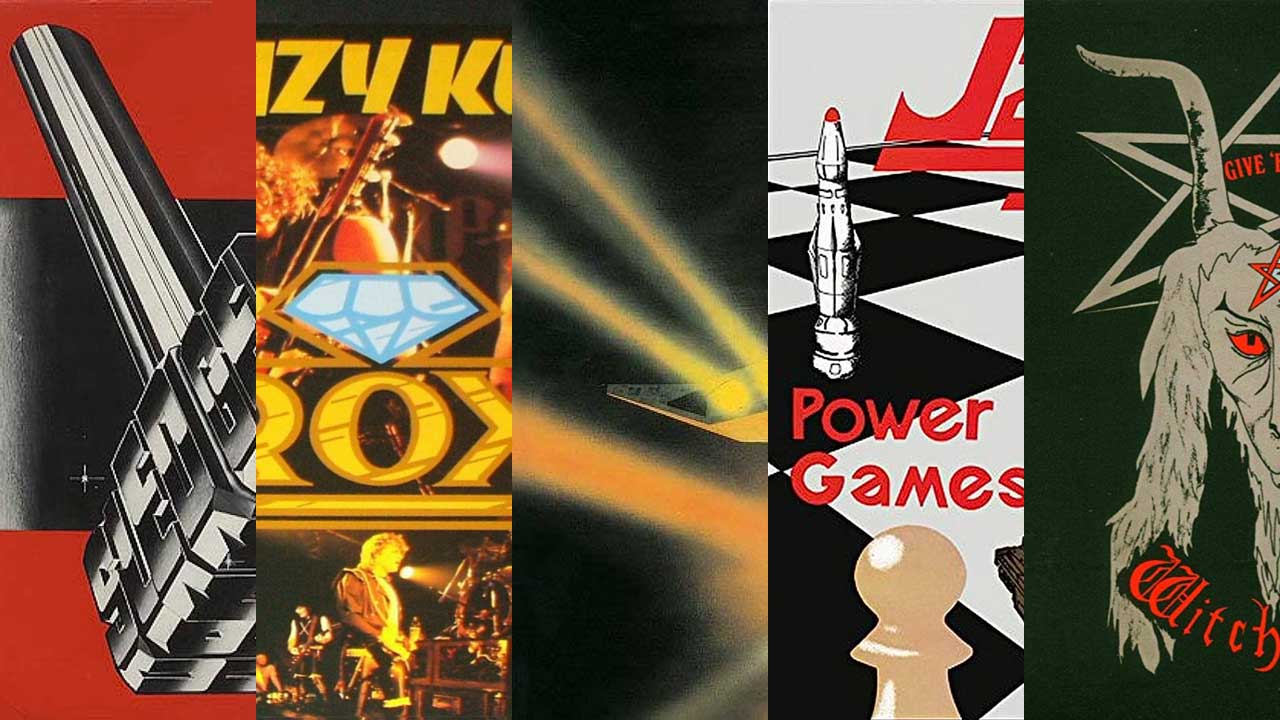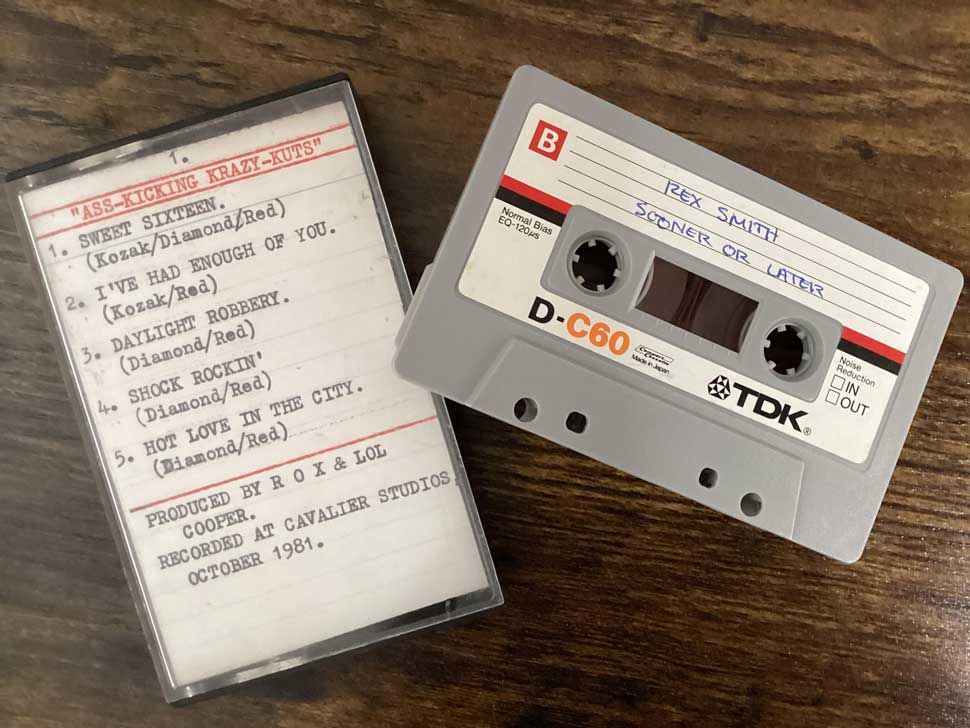Five brilliant but obscure NWOBHM albums that could have been huge in a parallel universe
They could have been Iron Maiden. Or Def Leppard. Or even Saxon. But they weren't

Select the newsletters you’d like to receive. Then, add your email to sign up.
You are now subscribed
Your newsletter sign-up was successful
Want to add more newsletters?

Every Friday
Louder
Louder’s weekly newsletter is jam-packed with the team’s personal highlights from the last seven days, including features, breaking news, reviews and tons of juicy exclusives from the world of alternative music.

Every Friday
Classic Rock
The Classic Rock newsletter is an essential read for the discerning rock fan. Every week we bring you the news, reviews and the very best features and interviews from our extensive archive. Written by rock fans for rock fans.

Every Friday
Metal Hammer
For the last four decades Metal Hammer has been the world’s greatest metal magazine. Created by metalheads for metalheads, ‘Hammer takes you behind the scenes, closer to the action, and nearer to the bands that you love the most.

Every Friday
Prog
The Prog newsletter brings you the very best of Prog Magazine and our website, every Friday. We'll deliver you the very latest news from the Prog universe, informative features and archive material from Prog’s impressive vault.
When tasked with identifying the best of the New Wave Of British Heavy Metal, it’s tempting to plump for the obvious: Iron Maiden, Saxon, Venom, Diamond Head et cetera. Pointedly, we should exclude Def Leppard from any such list because, as Joe Elliott has insisted on numerous occasions, the Leps were categorically not part of the scene. (Even though they quite clearly were.)
Some mention Judas Priest and Girlschool as contenders but these are the notions of dullards. Metallica got it right when they recorded their celebrated cover versions. Sure, they dabbled with songs by the likes of the aforementioned Maiden and Mr. D. Head, even throwing in a portion of non-NWOBHM Budgie for good measure, but Lars & Co. truly excelled, truly triumphed, on the more obscure tracks they chose to make their own: viz. Blitzkrieg’s self-titled assault on the senses and Holocaust’s bleary-eyed bag o’ bludgeon, The Small Hours.
Thus we shall adopt this tangential approach to our Top Five choices. Here be a gaggle – or should we say gargle – of less lauded, but nevertheless outstanding, NWOBHM mightiness.

Jaguar – Power Games (1983)
Released via the legendary Neat Records label at the end of the NWOBHM, Power Games might just be the most underrated album of the entire genre. If you’ve ever heard Metallica’s No Life ’Til Leather demo – and if you haven’t, why the hell not?! – you’ll know where this Bristolian outfit are comin’ from (just don’t say Bristol).
Raw like a weeping wound; rampant like Nazareth’s fifth album; blistering like a Bunsen burner to the bicep… this is speed/thrash metal in its/their glorious infancy. We advise you to avoid the basic version of Power Games; there are must-hear extended versions available. Seek out the ones that include the fierce’n’furious Back Street Woman and the deliriously demented Axe Crazy (neither on the original LP) to relish the full-fat rubber-burnin’ E-Type experience.
Oh, and a special mention for Power Games’ opening track Dutch Connection. Written to celebrate Jaguar’s early success in the Netherlands (kudos to revered local metal mag Aardschok for championing ’em), the song is a complete clog-hopping delight, with the lyrics: ‘I’m a fool for you and I love your [wooden] shoes.’ Best enjoyed with a smoke and a pancake.
Rox – Krazy Kutz (1983)
Alright, so this ain’t an album – it’s a three-track EP, released via the estimable Music For Nations and produced by label boss, the late, lamented Martin Hooker. Despite – more likely because of – hailing from rain-sozzled Manchester, Rox lived in a fantasy world of exploding dry ice and swirling flashbombs, or vice versa (as Samson would put it). Rox had aspirations to be Britain’s answer to Mötley Crüe but in reality they had more in common with Muttley from Wacky Races.
Sign up below to get the latest from Classic Rock, plus exclusive special offers, direct to your inbox!
Still, that was, and remains, part of their indefinable charm. Rox’s song titles (Sweet Sixteen, Sidewalk Strutter, Shock Rockin’) were ace and they talked a good game: ‘Hard rock that dazzles, lyrics that teaze and taunt… the star-studded Titans Of Teenteeze!’ I’ve harboured an unhealthy obsession with Rox ever since they sent me a cassette demo in 1981.

Connoisseurs will note that Rox’s fledgling songs were taped over a C60 copy of the Rex Smith album Sooner Or Later; Rex being the brother of Michael Lee Smith, lead singer of Starz. Sheesh, talk about flaunting yer cock-rock credentials!
The squeaky-parrot voice of Rox frontman Kiss-Ass Kevin ‘Sebastian’ Kozak was an acquired taste and for full-length LP Violent Breed (also 1983) he was savagely replaced by, er, Mark Savage. The classic Rox triumvirate of Kozak and guitarists Paul Diamond and Red Hot Red (real name: Ian Burke) reunited for the album Roxstars in 2019 but nary a ripple of interest was detected. Fun fact: Rox were originally called Venom.
Fist – Turn The Hell On (1980)
‘Akin to a 10-ton block of concrete dropped from a great height on the brain.’ I’d love to have written that line but, credit where credit’s due, it’s actually from a Record Mirror review of the Fist single Name, Rank And Serial Number.
Originally known as Axe and hailing from South Shields, Fist were part of the NENWOBHM (North East New Wave Of British Heavy Metal: think Mythra, Hollow Ground, White Spirit, Avenger, Hellenbach, Raven, Venom… the list goes on). Fist might’ve been gruff knuckledustin’ Geordies but they had surprisingly cerebral lyrical approach, not to mention a vocalist – Keith Satchfield – who sounded like a foghorn. (Foghorn On The Tyne, anyone?)
The aforementioned Name, Rank… concerns an insidious wartime interrogation: ‘There’ll be no need for torture… you have a cigarette, relax and tell me all, you know what to do…’; SS Giro offers a sardonic twist to the dole-queue blues: ‘I’m travelling first class on the SS Giro/It’s a journey into space on the welfare state’; You’ll Never Get Me Up (In One Of Those) confronts fear-of-flying phobia and comes complete with the anguished cry: ‘I ain’t goin’!’
TBH, Fist’s early recordings for Neat Records were better than this full-length, which gained a major label release via MCA and was hobbled by a mismatched choice of producer (Derek Lawrence). But then MCA had a history of shafting their NWOBHM signings, also including the likes of Tygers Of Pan Tang, Diamond Head, White Spirit and Quartz, so we shall gloss over that particular misstep.
Further fun fact: Canadian band Fist changed their name to Myofist to avoid confusion with the NWOBHM Fist. Why Myofist? Fuck knows.
Bonus fun fact: If Fist were German, they would be called Faust. How weird is that?!
Final fun fact: The sleeve artwork to Fist’s Name, Rank… single was designed by Conrad Lant, aka Cronos of Venom.
Witchfynde – Give ’Em Hell (1980)
It’s a mystery why Mansfield mystics Witchfynde weren’t snapped up by a major label. The band languished on obscure imprints such as Rondelet and Expulsion while their peers were somewhat deviously reeled in by tempting promises of greatness.
In truth, the slick-suited A&R types who drove up from the smoke in their company Cortinas were all-too-anxious to grab a piece of the action. By and large, said sharp-dressed men had little understanding of the NWOBHM phenom. Unless a band had a very strong manager – a Smallwood, a Mensch – their records were languishing in the bargain bin before they knew it. (Diamond Head were managed by singer Sean Harris’ mother, Linda, and her boyfriend, Reg Fellows – and look what a pickle they got themselves into.)
But I digress. Often wrongly dubbed a black metal band, Witchfynde were much more sophisticated than that. Even today, their eclectic Satanic musings exude a wistful menace; their music could almost be described as paganistic psychedelic progressive rock. The hero of the hour was, and remains, guitarist Montalo (real name: Trevor Taylor), formerly of the bizarrely named Atiofel. Montalo’s tortuous, enigmatic playing was more cryptic than the back catalogue of Bobby ‘Boris’ Pickett & The Crypt-Kickers.
If one was to listen to a single track of Witchfynde’s, it would have to be Leaving Nadir. As meandering as an oxbow lake, mysterious, otherworldly, it soothes and caresses in the manner of a demonic lullaby. And then you Wake Up Screaming.
Sledgehammer – Blood On The Hands (1983)
Grizzled former readers of Sounds music weekly might remember fragrant writer Robbi Millar’s description of Sledgehammer’s self-titled single: ‘Surely the worst song to have ever been played on the office stereo.’ Similarly, Sounds’ Garry Bushell referred to Sledgehammer (not the Peter Gabriel track) as ‘disastrous’ when it appeared on the Metal For Muthas NWOBHM compilation ‘abortion’.
We rock critics are often – make that frequently – wrong and history proves that Millar and Bushell were well wide of the mark. Hailing from Slough, home of Ricky Gervais’ The Office, Sledgehammer – famously described as 'a three-piece Bucks-based bulldozer’ – were actually the antithesis of their basic-as-bollocks ‘heavy metal’ name. The bayonet-bristlin’ Over The Top 1914 beats Iron Maiden’s bloated Paschendale into a top tin-hat, while the thoughtful Perfumed Garden and the downright weird Garabandal display undeniable prog influences.
Having once interviewed SH mainman Mike Cooke, this writer can confirm that he was a very serious individual indeed. (Better make that Metal For Maestros.) As the celebrated poet John Betjeman once wrote: ‘Come friendly bombs and fall on Slough! It isn’t fit for humans now.’ Sledgehammer duly obliged.
Geoff Barton is a British journalist who founded the heavy metal magazine Kerrang! and was an editor of Sounds music magazine. He specialised in covering rock music and helped popularise the new wave of British heavy metal (NWOBHM) after using the term for the first time (after editor Alan Lewis coined it) in the May 1979 issue of Sounds.

